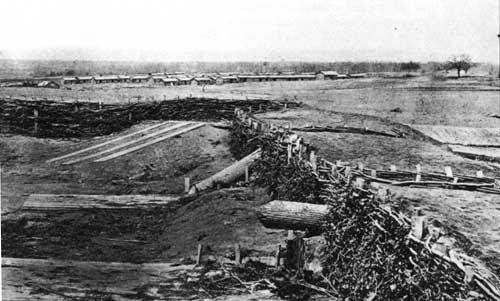|
MANASSAS National Battlefield Park |
 |

Quaker guns at Centreville. Confederate winter
quarters are shown in background.
Wartime photograph. Courtesy
National Archives.
Winter's Lull
Following the conclusion of the first Manassas campaign, the war in Virginia "languished" until the spring of 1862. The North, smarting from the humiliating defeat suffered at Bull Run, now turned with grim determination to the mobilization of its resources and to the training of the great land forces necessary to subjugate the South. Maj. Gen. George B. McClellan, fresh from victories in western Virginia, was immediately called to the command of the Federal forces around Washington. Soldierly in bearing and engaging in manner, McClellan proved a popular choice with the Nation and the army. With marked success he initiated a program of organization and training of the great Army of the Potomac. Recruits now streamed into Washington by the thousand. By December, there were 150,000 in training; by spring, over 200,000.
Meanwhile, the Confederate army under Joseph E. Johnston remained encamped at Centreville with outposts along the Potomac. Jackson, with a detachment, was stationed at Winchester. It was during this time that Johnston established a very strongly fortified position consisting of an L-shaped line of earthwork forts and batteries connected by infantry trenches that extended along the eastern and northern crests of Centreville for a distance of approximately 5 miles. Gradually, on the approach of winter, log or board huts were constructed for winter quarters for the troops. These were so located as to permit the troops easy access to the fortifications
With the worsening condition of the roads the problem of supply became increasingly difficult. It was then that Johnston built a branch railroad from his base at Manassas Junction. This was one of the first railroads ever to be used solely for military purposes.

|

|
|
Last Modified: Sat, Apr 7 2001 10:00:00 am PDT |


